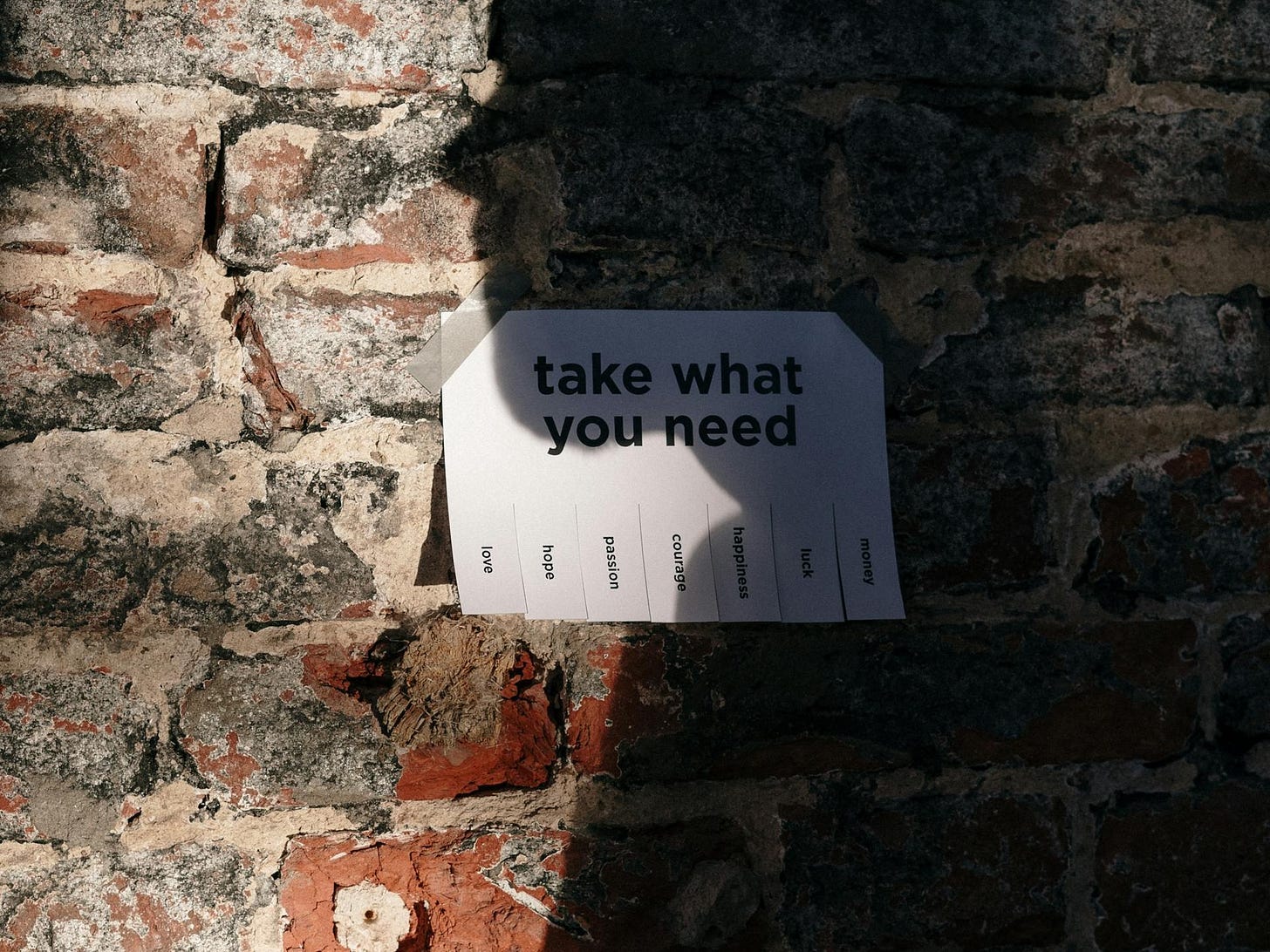No man is an island
“If you want to go fast, go alone. If you want to go far, go together.“—African
There are times you need to go fast but most of life is about going the distance.
In this one:
Deeds
Size
YOLO
Welcome, friend.
STORY
A friend in deeds
Friendship is a place of action. It’s also a place of words. Many of them. But in the end, we are judged more by what we do than what we say.
Relationships are inherently functional. Their purpose is our well-being, our survival as social beings wired to seek the best odds in life. We form friendships to belong, to be understood, and to receive & give support.
Even when we don’t consciously acknowledge it, every relationship has an implied expectation. A return of some kind.
We say we “make” friends, because friendships are not merely found but built. They take work. They require effort. They demand action. And just as in any meaningful endeavor, mutual understanding plays a big part. The healthiest friendships recognize not just shared joys but also differing realities.
We live in an increasingly utilitarian world. People assess relationships based on an unstated required rate of return. Everybody is looking for something: companionship, opportunity, validation, growth…always something.
Some friendships are like a “buy and hold”, safe and enduring. Others need active management, adjusting as life shifts. And then there are those where the right move is to cut losses. A “sell”, so to speak.
Not every relationship is meant to last forever, and recognizing when to let go is just as important as knowing when to hold on. Holding on too long can turn something meaningful into a burden. Letting go too soon might mean losing something valuable before its time. The challenge lies in discerning the difference.
Shared interests keep relationships alive while they remain shared. When they diverge, outcomes vary. Sometimes conflict, sometimes quiet separation, and sometimes a revealing of values that either deepens the connection or affirms the need to part ways.
Losing a shared interest doesn’t always mean the end. Instead, it can clarify whether there was something deeper holding it together all along. If values and mutual respect remain, the bond may evolve. If not, the separation can serve as an honest reflection of what truly connected the two in the first place.
We are often quick to judge others for their actions (or inaction), but we do so from our own perspectives. Understanding ‘function’ in relationships helps us be better judges of character, not just in others but in ourselves.
Friendship is, at its core, an investment. One that requires intention, effort, and a willingness to recognize its nature, both in its best form and its worst.
EXPLAINER
Social capital pt. 2: Bigger isn’t always better
There’s a limit to the number of relationships anyone can actively maintain. I don’t know what that number is.
The number of connections you have on LinkedIn or in your phonebook doesn’t define it. But it tells you something about it.
You see, there are levels in a network. I like to think about it as a series of concentric circles, with you at the center.
Proximity to the core implies a stronger connection. What makes it stronger depends on subjective measures that you value:
Shared history – time spent together, formative experiences;
Common goals – professional ambitions, lifestyle choices, values;
Emotional connection – trust, vulnerability, mutual support;
Utility – what someone can offer e.g. knowledge, opportunities, resources;
Respect & admiration – seeing someone as a role model or equal;
Energy exchange – how they make you feel (drained or inspired);
Consistency – the reliability of the connection.
The list can continue.
Your network isn’t a collection of names. It’s a form of social capital i.e. relationships that hold value depending on their strength, alignment, and the roles they play in your life.
The only part of this picture that remains fixed is the center. This is one instance where the world does, in fact, revolve around you. Your world, your relationships, your perspective. Everyone else shifts. Some move closer. Some drift away.
For the most part, you determine who gets closer. But relationships take effort, and effort isn’t infinite. The closer someone is to your core, the more energy, attention, and commitment that connection demands. Not everyone is meant to stay in close orbit. Some relationships function best at a distance, while others naturally fade. That’s life.
Over time, people will shift positions within your network. Some will earn their way inward. Others will, by choice or circumstance, move outward. Your philosophy about relationships shapes the rules that govern these movements.
Entry to a deeper level comes with a cost of time, trust, and reciprocity. Departure, on the other hand, is often free.
A larger network isn’t necessarily a stronger one. The strength of your relationships isn’t in their number but in their depth and alignment. Bigger isn’t always better. The right connections, in the right places, at the right times, those are what matter most.
In the end, your network isn’t just about who you know. It’s about the quality of those connections and the value they create over time. That’s social capital at work.
CURIOUS
A high-performing life
What if you saw your life as a single, cohesive whole at all times?
Most of us live zoomed in, focused on individual moments. This keeps us reactive, blind to the bigger picture, and more accepting of mediocrity. It makes it easier to justify poor decisions.
But when you zoom out and consider the path that led you here (whether you're satisfied with it or not) you start to see life for what it truly is: the sum of every choice you've made, in every circumstance you've faced.
The future is uncertain. The only way to live well is to give your best every day.
Naval Ravikant puts it this way:
"The only true test of intelligence is if you get what you want out of life."
But he adds an important qualifier: You must first want the right things. That clarity takes work. The best outcomes come from thinking for yourself and making your own decisions.
A reminder: You only live this life once. Choose wisely how you spend it, who you spend it with, and what you spend it on.
This conversation between Naval and Chris Williamson gave me great perspective. I hope it does the same for you.
One more thing…
The people around us shape our trajectory, not just by what they offer, but by how they align with our values, ambitions, and energy. If you want to go fast, you can move alone. But if you want to go far, you’ll need the right people in the right places.
That doesn’t mean more. It means better.
Have the best week possible.
AG
🎯Don’t take my word for it
Here’s what a friend from the March 22nd masterclass had to say about it:
“I am so glad to have found a wholesome masterclass on money not just about chasing the bag but why, what for, when etc. I honestly found so much comfort in realising that money is not as simple as the paper but how your mind and emotions come into play every time you think about money.” —Maggie M.
We have some early bird tickets available for the next one. Reserve a seat here before they fill up if you’re interested & available.
If you enjoyed this edition of Unstructured Notes, click the ❤️ button so more people can discover it & feel free to share it with friends!





